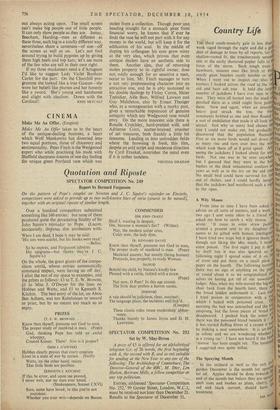Quotation and Riposte
SPECTATOR COMPETITION No, 249 Report by Bernard Fergusson On the pattern of Pope's couplet on Newton and J. C. Squire's rejoinder on Einstein, competitors were asked to provide up to two well-known lines of verse (source to be named); together with an original riposte of similar length.
Over a hundred competitors submitted something like 160 entries: but none of them produced quite the devastating finality of Sir John Squire's rejoinder to Pope. (Lacon, incidentally, disputes this attribution with:
When I am dead, I hope it may be said: 'His sins were scarlet, but his books were read.' —Belloc.
So he expires, and Fergusson admires His epigrams—but thinks they're J. C. Squire's.)
On the whole, the great giants of the compe- tition world, whose. entries automatically command respect, were having an off day. I allot the rest of my space to examples, and the prizes as follows: £3 to T. E. W. Browne, El to Miss J. O'Dwyer for the lines on Hobbes and Watts, and £1 to Kenneth S. Kitchin. The best entry of the lot, on Abou Ben Adhem, was too Rabelaisian to reward or print, but by no means too much so to enjoy.
PRIZES
(T. E. W. BROWNE) Know then thyself, presume not God to scan, The proper study of mankind is man. (Pope)
God, thinking Pope has told an awful whopper,
Created Kinsey. There! Now is it proper? (miss .1. O'DWYER)
Hobbes clearly proves that every creature Lives in a state of war by nature. (Swift) Watts, on the other hand, insists That little birds are pacifists.
(KENNETH S. KITCHIN)
If this be error, and upon me proved, I never writ, nor no man ever loved.
• (Shakespeare, Sonnet CXV1) Sure, some have loved; in this you're not mistaken: Whether you ever writ—depends on Bacon. COMMENDED
(SIR JOHN CRAIG)
Shall I, wasting in despair, Die, because a woman's fair? (Wither) Nay, the modern suitor cries, Cuter now, the lady dyes.
(R. KENNARD DAVIS)
Know then thyself, presume not God to scan, The proper study of mankind is man. (Pope) Mankind assents; but mostly (being human) Proceeds, less properly, to study Woman.
(Rums) Behold the child, by Nature's kindly law Pleased with a rattle, tickled with a straw.
(Pope) Not now, 0 Poet In this age atomic The little dear prefers a horror comic.
(Pinwon) A tale should be judicious, clear, succinct; The language plain, the incidents well link'd.
(Cowper) These classic rules rouse modernists' abhor- rence, Thanks mainly to James Joyce and D. H. Lawrence.








































 Previous page
Previous page